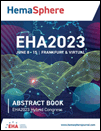PB2699: CONSENSUS FROM AN EXPERT PANEL ON THE CURRENT MANAGEMENT OF SECONDARY IMMUNODEFICIENCY IN PATIENTS WITH HEMATOLOGICAL MALIGNANCIES IN SPAIN
Abstract Topic: 35. Quality of life and palliative care
Background: Adequate management of secondary immunodeficiency (SID) patients in routine daily practice is challenging due to the lack of standardized protocols, disparities related to appropriate vaccination coverage, immunization schedules, use of antibiotic prophylaxis, and uncertainties regarding when to initiate therapy or when to discontinue immunoglobulin replacement therapy (IgRT).
Aims: The first objective of the study was to know the opinions and details of routine clinical practice of experts in hematology and immunology in the management of patients with hematological malignancies and SID. The second objective was to develop consensus among participants in order to optimize the care of these patients.
Methods: A cross-sectional Delphi-based survey was created to gauge the perspectives of clinical hematology and clinical immunology experts from Spain (n = 17 and n = 18 respectively) on SID related to the treatment of onco-hematological patients. A scientific committee formed by five specialists (four hematologists and one immunologist) with proven experience and interest in SID to hematological malignancies was established. The scientific committee was responsible for the development of the study questionnaire, and one hematologist and one immunologist coordinated the study. The design of the study included three phases: 1) an initial proposal of the scope of the questionnaire by the study coordinators after extensive review of the literature and drafting of the different items, 2) a meeting of the members of the expert committee for discussing and modifying the content of the questionnaire, and 3) a final process of development and validation of the definitive questionnaire by the expert committee.
Results: In accordance with the recommendations that were raised, there was unanimous acknowledgement on necessity of the following issues: to have available guidelines for the management of immunodeficiencies in hematological patients, to perform a baseline immunological evaluation in patients with chronic lymphocytic leukemia (CLL), multiple myeloma (MM) and hematopoietic stem cell transplantation (HSCT) recipients, and to quantify IgG, IgA and IgM levels when SID is suspected. In addition, more than 90% of participants agreed that patients with CLL, MM, and lymphoma should get active vaccination against seasonal influenza, H1N1, pneumococcus, and Haemophilus influenzae. When IVIG treatment is administered, there was general agreement on IgG levels should be checked every three months (83%) and that IVIG should be stopped when IgG levels had recovered after a 12-month follow-up (77%). There was unwavering consensus that a clinical protocol for the use of IVIG in the treatment of SID should be readily available (94%), that trough IgG levels should be monitored to establish the appropriate IVIG dose (86%), and that IVIG therapy should be stopped after IgG levels had recovered (77%).
Summary/Conclusion: The results of this study may help hematologists and immunologists make better management decisions for SID in clinical practice and encourage tighter collaboration between them for the benefit of this particular patient.
Keywords: Immune deficiency, Immunoglobulin




